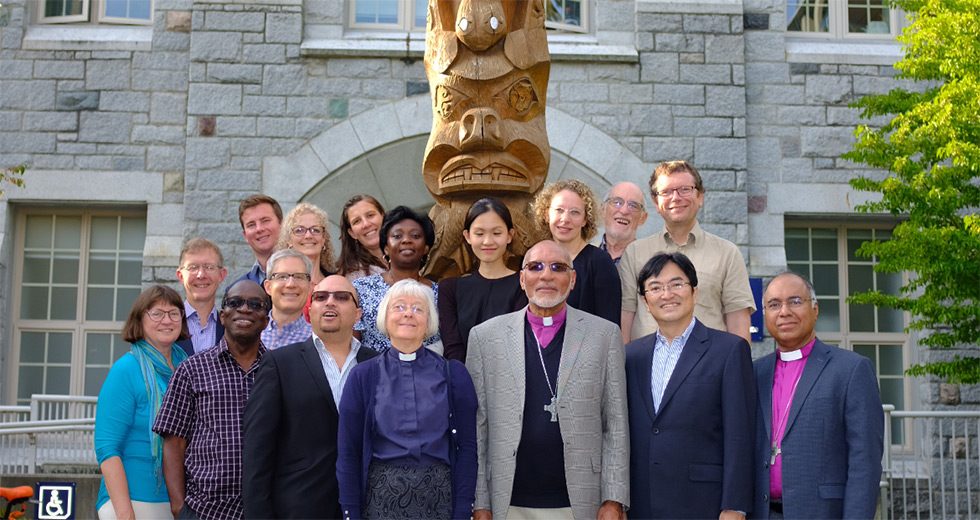Communion dialogue with Anglicans shaped by Indigenous context
Posted on September 5, 2018 by Phil Tanis

The latest gathering of the International Reformed–Anglican Dialogue (IRAD) between the World Communion of Reformed Churches (WCRC) and the Anglican Communion was again driven in part by the local context.
As at previous meetings of the Dialogue (in India, the United Kingdom and South Africa) the local context gave both welcome and necessary insights to the substantial issues under discussion, which are focused on koinonia (communion).
In Vancouver, Canada, the participants were welcomed with a ceremony of the Musqueam people on whose land they met. They also heard memories and experiences of church leaders from Cree and Gitxsan First Nations.
The Canadian churches continue a journey from colonial oppression of Indigenous people toward reconciliation. In the Canadian context, the loss of koinonia with the land and creation as well as between peoples was an acute reality being borne witness to. But still, by the working of the Holy Spirit, there was witness to healing and new horizons of hope.
On Sunday, 26 August, IRAD participants attended a worship service at the Longhouse Council of Native Ministry of the United Church of Canada in East End Vancouver, a ministry that includes Indigenous persons. They were also joined by the co-chairs of the Canadian Anglican Church of Canada–United Church of Canada Dialogue, who attended as observers throughout the week.
The scope of the theme is both exciting and challenging, report participants. Koinonia is adopted within the New Testament to push in a number of ways the commonality of inheritance and calling through faith. It introduces both experiences of blessing, with potential for more, and at the same time a keen, and at times immensely painful, realization of the distance yet to be travelled—since exclusions and partisanship are forever re-forming.
Preparations for this round of the Dialogue consisted of work on a first draft of a report which drew on the many and rich contributions received in earlier rounds around the theme. As the participants worked on this first draft of a report, a tripartite structure was discerned, namely where does koinonia come from? How has it been embodied? And how can koinonia shape the priorities of church and world?
The Dialogue opened with a celebration of Holy Communion in the Reformed tradition and closed with a celebration of Holy Communion in the Anglican tradition. The members of the Dialogue prayed together mornings and evenings. This fourth round of the Dialogue was generously hosted by the WCRC. The hospitality of Vancouver School of Theology was greatly appreciated.
IRAD met at Vancouver School of Theology 24-30 August 2018 under the leadership of co-chairs Elizabeth Welch (WCRC) and Howard Gregory (Anglican Communion). The next IRAD meeting is scheduled for August 2019 in Hiroshima, Japan.
Anglican Communion participants: Howard Gregory, Church in the Province of the West Indies; Clint Le Bruyns, Anglican Church of Southern Africa; James Hawkey, Church of England; Renta Nishihara, Anglican Communion in Japan; Helene T. Steed, Church of Ireland; staff: John Gibaut (co–secretary), Neil Vigers, Anglican Communion Office.
WCRC participants: Elizabeth Welch, United Reformed Church (United Kingdom); Peter Donald, Church of Scotland; Priscille Djomhoué, United Protestant Church in Belgium; Roderick Hewitt, Uniting Presbyterian Church in Southern Africa; R. Gerald Hobbs, United Church of Canada; Aimee Moiso, Presbyterian Church (USA); Royce M. Victor, Church of South India; staff: Hanns Lessing (co-secretary); Eri Yoon, WCRC intern; C. Nolan Huizenga (minutes).
Observers: Sandra Beardsall, United Church of Canada; Lynne McNaughton, Anglican Church of Canada.
 World Communion of Reformed Churches
World Communion of Reformed Churches